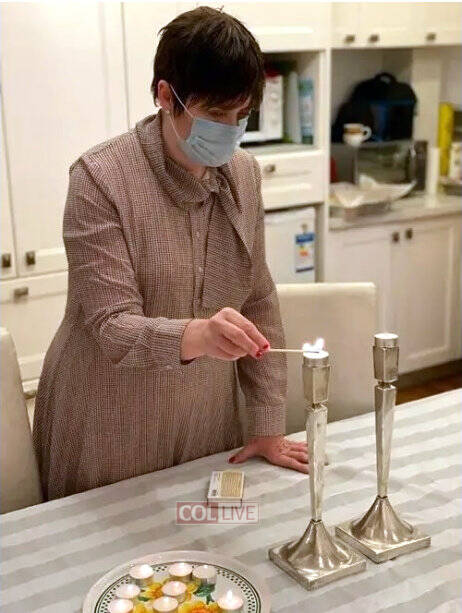Dini Freundlich arrived in the United States two weeks ahead of her keynote address at the International Conference of Chabad-Lubavitch Women Emissaries (Kinus Hashluchos), not because she needed to prepare, but because she had to be sure she was healthy—a sort of self-quarantine before interacting with thousands of other women in Brooklyn, N.Y.
Her life has been anything but simple over the past month. Freundlich, who co-directs Chabad Lubavitch of Beijing with her husband, Rabbi Shimon Freundlich, has had to help her family and the community deal with the deadly COVID-19 coronavirus as it has spread from its origination in Wuhan, Hubei Province, to other areas of China and the world, including, as of this week, more than two-dozen confirmed cases in the United States.
Freundlich brought her two youngest children along—she is the mother of six and grandmother of two—while her husband remains in China, handing out protective face masks and doing whatever he can to help residents and tourists.
The kids, ages 8 and 12, attend the Ganeinu International School in Beijing, but have been off since the weeklong break for Chinese New Year in late January. After the holiday, the country shut down schools indefinitely due to fears of the virus spreading, so the trip has proven a welcome break from both the stressors of being outside and the boredom of being inside—a factor that seems to have gone overlooked in all the urgency.
“The Israeli embassy sent home families with kids, and the U.S. embassy evacuated everyone under 21, and we tend to follow their guidelines,” Freundlich tells Chabad.org of diplomatic activity in China’s capital of Beijing.
She and her children are scheduled to return in early March, and Freundlich makes it clear that they will go back, even though flights on Air China have become more sporadic. U.S. carriers have canceled their flights until the end of March.
But her attention has turned from the virus that’s made headlines on a daily basis to the task at hand: serving as keynote speaker for the conference, which runs from Thursday through Sunday night, when she will address a room filled with 3,100 colleagues and guests at the gala banquet.
On Monday morning, groups of women will conclude four days of consecutive programming with a visit to the Rebbe‘s Ohel in Queens, and the Rebbetzin Chaya Mushka Schneerson, of righteous memory, whose yahrtzeit is honored at the women’s Kinus.
The Rebbetzin’s yahrtzeit holds special meaning every year for the thousands of women leaders from all over the world who gather to learn, get advice, share stories and reunite with family and friends. It is a poignant reminder of how the Rebbetzin remains an ongoing role model for the shluchos and Jewish women everywhere.
The theme this year is centered on ahavat Yisrael (“love of fellow Jews”), and the concept hits home for Freundlich. “I feel strongly that there are so many things that unite us, as opposed to divide us,” she says.
While the mission of the Rebbe was multifaceted, she points out, emphasis was placed on the idea that “a Chabad House should be a home—a home that’s not only inspiring, but where a Jew can feel comfortable and welcome wherever they may be in the world.”
The gala banquet of the International Kinus Hashluchos will be held on Sunday, February 16, 2020 at 5:45 PM Eastern Time and will be broadcast on COLlive.com.







